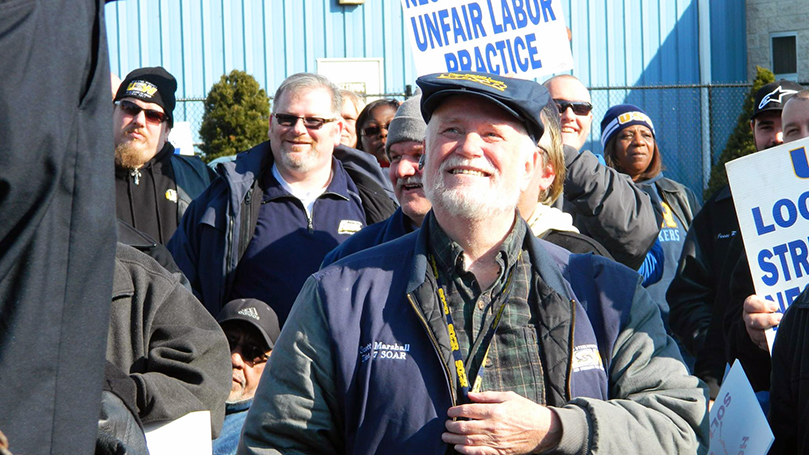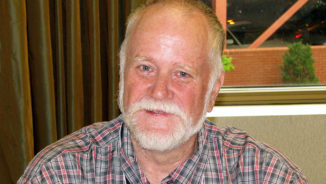
Editor’s Note: The role of organized labor under the Trump regime is part of the broader controversy about the working class as a force of social transformation. Here, longtime trade unionist and CPUSA leader Scott Marshall dispels some of the myths about union voters and highlights the growing progressive trend in organized labor.
Q: What role did issues like globalization and the TPP play among union voters in the 2016 elections? Were they part of discussions?
A: For sure. In terms of people who voted for Trump, that was the number one thing. The labor movement did a lot of work on all the trade deals. In the early days of the campaign, there was a big focus on the international tribunals. There was a lot of outrage at the idea that corporations would be able to disregard or overturn state and federal laws that interfered with their ability to make a profit. One big example was companies being able to sue countries that passed anti-smoking laws.
Another point that people brought out was that the trade agreements contributed to the decline of manufacturing.
Q: It seems like there’s a nationalist spirit in some parts of labor (buy American—for example, the idea of “buying American”, or blaming foreign workers.) How did that factor into union voters’ decisions? Was Trump able to capitalize on that?
A: It was Trump who made that more of an issue with people. In my union, the United Steelworkers,, people talked about keeping things “made in America” rather than “buying American”. So I don’t think we can really talk about nationalism.
And when it comes down to it, are there any American corporations? Not at the monopoly level, not at the corporate level. These guys are everywhere. In the case of Carrier, which was Trump’s big example, union members recognized that it was the company that was moving jobs, not Mexican workers.
 There’s now an international labor federation called IndustriALL that brings together unions in industrialized countries across the world. Organized labor is recognizing that you can’t have power over transnationals unless you organize the entire supply chain. In our union, we start where the rubber is harvested, in Africa, and go all the way to the factories where tires are made. And more and more unions, and workers, are becoming aware of that idea.
There’s now an international labor federation called IndustriALL that brings together unions in industrialized countries across the world. Organized labor is recognizing that you can’t have power over transnationals unless you organize the entire supply chain. In our union, we start where the rubber is harvested, in Africa, and go all the way to the factories where tires are made. And more and more unions, and workers, are becoming aware of that idea.
Q: What role, or roles, has organized labor been playing in the resistance to the Trump regime?
A: The best way to track labor’s role in the resistance is to look at what the AFL-CIO is doing. One of the huge fights right now has to do with Trump’s attempt to stack the National Labor Relations Board with corporate shills and anti-labor lobbyists.
There’s also a lot of emphasis on specific legislation. Republicans have introduced a bill that would force workers to give up overtime pay in favor of comp time. Time off is nice, but the problem with this bill is that the comp time is at the company’s discretion. Workers wouldn’t be able to decide when to use the comp time they received as overtime compensation! There has been a lot of fightback around that bill.
I don’t want to sugarcoat it, though. Some union workers were, and are, influenced by Trump. But that number is declining. More and more of the union voters who voted for Trump understand what a mistake they made—and union workers are quicker to come to that conclusion than others. There’s also a growing recognition that labor has to link up with other movements, including fights around discrimination.
Q: How can the labor movement move toward greater unity on these issues?
A: There’s still tension in the labor movement. You have some people who are really good on the issues, who understand the danger, but who say, “A big part of our membership is influenced by Trump, and we can’t ignore that. Let’s work to get what we can out of this.” They don’t want to write off members by making a frontal attack on Trump.
This way of thinking leaves people disillusioned—as they were with the promise to renegotiate NAFTA, for instance. Carrier is another example, where Trump promised to help workers and then abandoned them. That local supported Trump and Pence to save jobs. But now the president of the local is denouncing Trump as a liar.
On the other hand, a lot of people—more and more, in fact—point out that we can’t win over people who were influenced by Trump unless we’re seen as the best fighters for jobs, health care, and labor rights.
For example, healthcare is a big labor issue. One thing people don’t realize about the healthcare fight is that the GOP proposals could diminish coverage even under existing contracts. If Republicans manage to strip prenatal care out of the coverage requirements, you’d lose it in your contract. Giving leadership in these broader struggles will win those people back to a more progressive position.

Another thing that people in labor are coming to realize is that we can’t just dismiss people who voted for Trump as backwards idiots. This is pretty standard in the mainstream media—think of all the stories about “Such and such a Trump proposal would hurt his own voters most,” implying that those people aren’t enlightened enough to know where their self-interest lies. That sort of divisive, elitist thinking is broadly rejected in organized labor.
Q: The Communist Party USA has historically emphasized putting “labor up front” and building working-class leadership of the movement for social and political change. How do you see that happening in the labor movement under the Trump regime?
A: Really, the most important thing is building coalitions that broaden what we think of as labor, and organized labor. Virtually the entire labor movement embraces the Fight for $15 and the effort to organize low wage workers. They’re looking to workers not traditionally seen as part of labor movement—just look at the drives to organize college athletes and adjunct professors.
On the political end, trade unionists haven’t been shy about participating in organizations like Our Revolution and Indivisible, which formed in the wake of the 2016 elections. This is in the context, too, of labor’s ongoing effort to build its own political infrastructure—organizing its own phone banks, for example, and its own canvassing drives.
It’s important to point out, as well, that this political work isn’t limited to what people think of as traditional “labor issues” like wages or collective bargaining. The AFL-CIO has taken progressive positions on core democratic issues like LGBTQ equality, women’s rights, and immigrants’ rights. Labor leaders are speaking out against attacks on Muslims and other groups targeted by the Trump administration. These aren’t side issues or distractions or concessions—they’re core working-class issues, and people in labor realize that.


 Join Now
Join Now